高考英语典型陷阱题详解(时态)
2024年高考英语易错题(新高考专用)易错点07动词的时态和语态(4大陷阱)2

易错点07 动词的时态和语态目录01 易错陷阱(4大陷阱)02 举一反三【易错点提醒一】一般现在时、一般过去时和现在完成时易混易错点【易错点提醒二】一般过去时和过去完成时易混易错点【易错点提醒三】现在完成时和过去完成时易混易错点【易错点提醒四】主动语态与被动语态易混易错点03 易错题通关易错陷阱1:一般现在时、一般过去时和现在完成时易混易错点。
【分析】【高考链接】(2023年浙江卷1月)The large siheyuan of these highranking officials and wealthy businessmen often________ (feature)beautifully carved and painted roof beams and pillars(柱子).【答案】featured【解析】考查动词时态。
句意:这些高级官员和有钱商人的高大的四合院,通常以雕刻精美和被粉刷的房顶横梁和柱子为特点。
分析句子结构可知,空格处需要填谓语动词,再结合and后动词时态可知,空格处应用一般过去时。
故填featured。
易错陷阱2:一般过去时和过去完成时易混易错点。
【分析】1.下列动词hope、wish、expect、think、intend、mean、suppose等,用过去完成时表示“原本……(事实上未能……)”。
2.This/It/That was the first/second/third ... time that ...表示“这/那是(某人)第几次做某事”,that从句中要用过去完成时。
3.hardly ... when ...和no sooner ... than ...两个句型中,主句均用过去完成时。
易错陷阱3:现在完成时和过去完成时易混易错点。
【分析】易错陷阱4:主动语态和被动语态易混易错点。
【分析】➢受母语干扰,翻译上下文时混淆被动语态与主动语态。
➢混淆谓语动词被动语态构词be+done与非谓语动词重点过去分词done。
高考英语陷阱题总结归纳—形容词与副词(附详解)
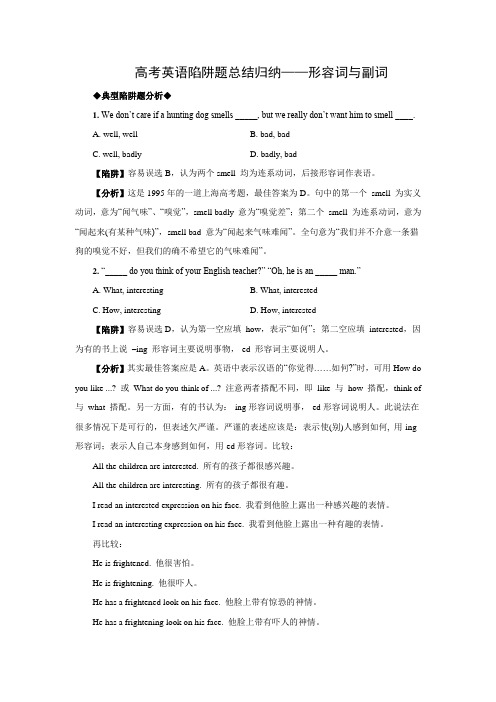
高考英语陷阱题总结归纳——形容词与副词◆典型陷阱题分析◆1.We don’t care if a hunting dog smells _____, but we really don’t want him to smell ____.A. well, wellB. bad, badC. well, badlyD. badly, bad【陷阱】容易误选B,认为两个smell 均为连系动词,后接形容词作表语。
【分析】这是1995年的一道上海高考题,最佳答案为D。
句中的第一个smell 为实义动词,意为―闻气味‖、―嗅觉‖,smell badly 意为―嗅觉差‖;第二个smell 为连系动词,意为―闻起来(有某种气味)‖,smell bad 意为―闻起来气味难闻‖。
全句意为―我们并不介意一条猎狗的嗅觉不好,但我们的确不希望它的气味难闻‖。
2.―_____ do you think of your English teacher?‖ ―Oh, he is an _____ man.‖A. What, interestingB. What, interestedC. How, interestingD. How, interested【陷阱】容易误选D,认为第一空应填how,表示―如何‖;第二空应填interested,因为有的书上说–ing 形容词主要说明事物,-ed 形容词主要说明人。
【分析】其实最佳答案应是A。
英语中表示汉语的―你觉得……如何?‖时,可用How do you like ...? 或What do you think of ...? 注意两者搭配不同,即like 与how 搭配,think of 与what 搭配。
另一方面,有的书认为:-ing形容词说明事,-ed形容词说明人。
此说法在很多情况下是可行的,但表述欠严谨。
严谨的表述应该是:表示使(别)人感到如何, 用-ing 形容词;表示人自己本身感到如何,用-ed形容词。
“陷阱题”50例

高考英语典型“陷阱题”50例(含答案解析)同学们在平时做题的过程中有没有发现这样的现象:有些题目看起来似曾相识,轻而易举就可选出“正确答案”,结果往往发现自己错了。
这些题目就是我们所说的“陷阱题”。
它们看似简单,实则不易解答。
出题者往往设下“陷阱”,如果大家用固定的思维方式去考虑,就会误选答案。
近年来,高考试卷中也常有这种性质的试题出现。
当同学们遇到这种题时,既不可“轻易下手”,也不可不知所措,而应做到先三思而后行。
首先,同学们要认真审题,发现“陷阱”。
要灵活地运用语法规则,理顺思路,寻找“陷阱”。
其次,要运用多向思维,分析“陷阱”。
不要用习惯的、单一的、片面的思维去解题。
再次,要去伪存真,识别“陷阱”。
要抓住基本知识点及特殊现象,不厌其烦地归纳理解,认清选择题目中的“鱼目”及“珍珠”,避免落入“陷阱”。
最后就是要加强验证,跳出“陷阱”。
这就要求学习者要有良好的检查验证习惯,掌握验证的方法,即使落入了“陷阱”,也能在验证过程中,发现“陷阱”,并迅速地跳出来。
下面是—些比较典型的“陷阱题”.请大家做做看:1. Mr Wang made up his mind to devote all he could ______ his oral English before going abroad.A. improveB. to improveC. improvingD. to improving2. Everything he ______ away from him before he returned to his hometown.A. tookB. had been takenC. had had been takenD. had taken3. Before he went abroad,he spent as much time as he _____ English.A. could learningB. learnedC. to learnD. could learn4. You can never imagine what great difficuly I have ______ your house.A. foundB. findingC. to findD. for finding5. The person we spoke to ______ no answer at first.A. makingB. makesC. makeD. made6. The person we referred to ______ us a report tomorrow.A. givingB. will giveC. gaveD. give7. The days we have been looking forward to _______ soon.A. comingB. will comeC. cameD. have come8. The person we talked about ______ our school last week.A. visitingB. will visitC. visitedD. has visited9. The man whose songs we are fond of ______ in our city next week.A. singingB. to singC. will singD. sang10. Not only ______ the jewelry she _____ been sold for her son’s gambling debts but also her house.A. is;hasB. has;hadC. has;hasD. 不填;has11. ______ in thought,he almost ran into the car in front of him.A. LosingB. Having lostC. LostD. To lose12. The research is so designed that once nothing can be’done to change it.A. beginsB. having begunC. beginningD. begun13. —What do you think made the woman so upset?—_______ weight.A. As she put onB. Put onC. Putting onD. Because of putting on14. Time should be made good use of ______ our lessons well.A. learningB. learnedC. to learnD. having learned15. It was only with the help of the local guide ______.A. was the mountain climber rescuedB. then the mountain climber was rescuedC. when the mountain climber was rescuedD. that the mountain climber was rescued16. Never ______ time come again.A. has lostB. will loseC. will lostD. lose17. —______ was it ______ they discovered the entrance to the underground palace?—Totally by chance.A. What;thatB. How;thatC. When;howD. Where;that18. I have nothing to confess. ______ you want me to say?A. What is it thatB. What it is whatC. How is it thatD. How it is that19. Is this factory ______ you visited the other day?A. the oneB. thatC. whereD.when20. Was it _____ she heard with her ears really made her frightened?A:what;that B. it;thatC. that;whichD. what;不填21. ______ what the six blind men said sounded!A. How foolishlyB. How foolishC. What foolishlyD. What foolish22. It was ______ the old clock that the old man spent the whole morning at home.A. repairB. repairingC. to repairD. in repair23. Is this hotel ______ you said we were to stay in your letter?.A. thatB. whereC. the oneD. in which24. Please tell me the way you thought of ______ the garden.A. take care ofB. to take care ofC. takinq care ofD. how to take care of25. A fast-food restaurant is the place _______,just as the name suggests,eating is performed quickly.A. whichB. whereC. thereD. what26. The film brought the hours back to me ______ I was taken good care of in that far-away village.A. untilB. thatC. whenD. where27. The professor has written another book,________ of great importance to cornputer science.A. which I think it isB. and I think isC. which I think isD. when I think is28. —Where do you think ______ he ______ the computer?—Sorry,I have no idea.A. had;boughtB. has;boughtC. did;buyD. 不填;bought29. We should do more such exercises in the future,I think,_____ those we did yesterday.A. asB. likeC. aboutD. than30. He will tell you _____ he expects will win such a match.A. whyB. whomC. whichD. who31. In New Zealand,I made lots of friends _____ a very practical knowledge of the English language.A. getB. togetC. gettingD. got32. I’m busy now. I’m sorry I can’t help _____ the flowers.A. watedngB. wateredC. watersD. to water33. Who would you rather ______ the report instead of you?A. have writeB. have to writeC. writeD. have written34. We must stop pollution ______ longer.A. livingB. from livingC. to liveD. live35. —Was it under the tree ______ you were away talking to a friend?—Sure. But when I get back there,the bike was gone.A. thatB.whereC. whichD. while36. Not far from the club there was a garden,______ owner seated in it playing bridge with his children every aftemoon.A. whoseB. itsC. whichD. that37. Wang Ling was elected ______ all he is the tallest.A. becauseB. because ofC. forD. as38. We’ll be free tomorrow,so I suggest ______ to the history museum.A. to visitB. visitingC. we should visitD. a visit39. I like swimming,while what my brother enjoys ______.A. cookingB. to cookC. is cookingD. cook40. Thank you for the trouble you have ______ to help me.A. paidB. takenC. hadD. asked41. Who is it up _______ decide whether to goor not?A. to toB. for forC. to forD. for to42. We keep in touch ______ writing often.A. withB. ofC. onD. by43. —How long have you been here?—______ the end of last month,A. InB. ByC.AtD. Since44. You should treat him (in) the way ______ suits him most.A. thatB. in whichC. 不填D. why45. He insisted that the sky ______ clear up the following day.A. wouldB. shouldC. 不填D. be46. He is a strict but kind-hearted father,______ the children respect but are afraid of.A.不填B. thatC. for whomD. one whom47. Mr Smith is ______ a good teacher ______ we all respect.A. such;thatB. such;asC. so;thatD. so;as48. ______ nice,the food was all eaten up soon.A. TastingB. TasteC. TastedD. To taste49. —You haven’t been to Beijing,have you?—______. And how I wish to go there again!A. Yes,t haveB. Yes,I haven’tC. No,I haveD. No,I haven’t50. He was sentenced to death ______ what he has stolen from the bank.A. thatB. sinceC. becauseD. because of答案及辨析1.此题中包含固定短语devote…to,其中to为介词,后面应接动名词。
高考英语陷阱题总结归纳-状语从句

高考英语陷阱题总结归纳-状语从句◆典型陷阱题分析◆1. "May I go and play with Dick this afternoon, Mum?" "No, you can't go out _______ your work is being done."A. beforeB. untilC. asD. the moment【陷阱】容易误选B,误认为这是考查not…until…结构。
【分析】最佳答案选 C。
句中的 your work is being done 表明"你正在做作业",选 as 表原因。
2. "I'm going to the post office." "_______ you're there, can you get me some stamps?"A. AsB. WhileC. BecauseD. If【陷阱】容易误选A。
【分析】最佳答案选 B。
尽管 as 和 while 均可用作从属连词引导时间状语从句,表示"当……的时候",但两者有一个重要区别,就是这样用的 as 从句的谓语不能是状态动词。
当然,如果 as 不是表示"当……的时候",其谓语是完全可以用状态动词的。
如:I went to bed early, as I was exhausted. 我很累了,所以很早就上床睡了。
(此句中的 as 表示原因,意为"因为"、"由于")请做以下两题,答案均选 while,不选as:(1) _______ you are at home alone, please don't leave the door open.A. WhileB. AsC. BeforeD. How(2) _______ you are alone with her, tell her that you like her.A. WhileB. AsC. AfterD. How3. After the war, a new school building was put up ______ there had once been a theatre.A. thatB. whenC. whichD. where【陷阱】几个干扰项均有可能误选。
高考英语陷阱题总结归纳——动词时态
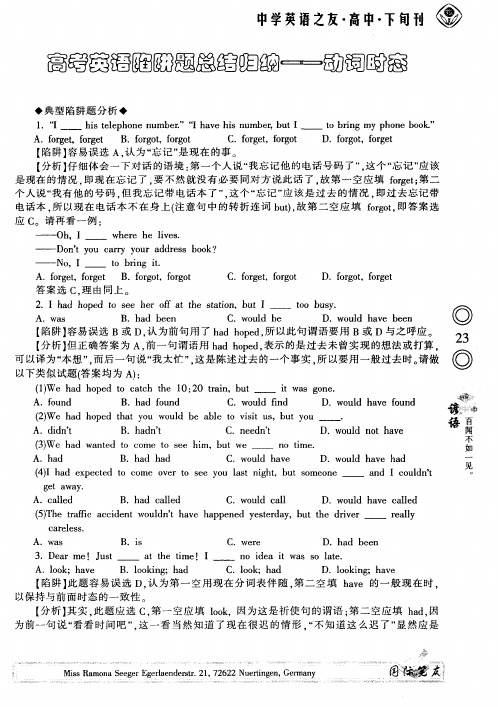
to o bu y s.
C.wo l e ud b
D.w u d h v e n o l a e b e
【 陷阱 】 易误选 B或 D, 为 前句用 了 hdhpd 所 以此句 谓语要 用 B或 D与之 呼应 。 容 认 a oe , 2 3 【 分析 】 正确答 案 为 A, 一句 谓语 用 hdhpd 表示 的是 过去 未 曾实现 的想 法 或打算 , 但 前 a oe , 可 以译 为“ 想 ” 而后 一句 说“ 太忙 ”这 是 陈述过 去 的一个 事实 , 以要 用一 般过 去 时。 做 本 , 我 . 所 请 以下类 似试题 f 答案 均 为 A : 1
B. h d a a h d
C ed’ .n e nt
C.wo l h v ud a e
D.w ud n th v o l o a e
语嘉
不
f) a a td t c m o se hm u e 3We hd w ne o o e t e i ,b tw
◎
◎
《霉 翁
() a o e h tyu w ud b be t vs S b ty u—— . 2We h d h p d ta o o l ea l o itU , u o i
A.dd ' int
A .h d a
谚 渗
B.h d ’ a nt
B.1 o i g a o k n ;h d
C.1 o ;h d o k a
D.1 o i g a e o k n ;h v
【 阱】 陷 此题 容 易误 选 D, 为 第一 空 用现 在 分词 表 伴 随 , 二 空 填 hv 的一 般 现 在时 , 认 第 ae 以保持 与前 面 时态 的一致 性 。 【 析】 实 , 分 其 此题 应选 c 第 一 空应 填 l k , o ,因为 这是 祈使 句 的谓 语 ; 二空 应填 hd 因 o 第 a, 为前一 句说 “ 看 时 间吧 ” 这 一 看 当然 知 道 了 现在 很 迟 的情 形 , 不 知 道 这 么迟 了” 然 应 是 看 , “ 显
高考英语考点典型陷阱题分析-被动语态
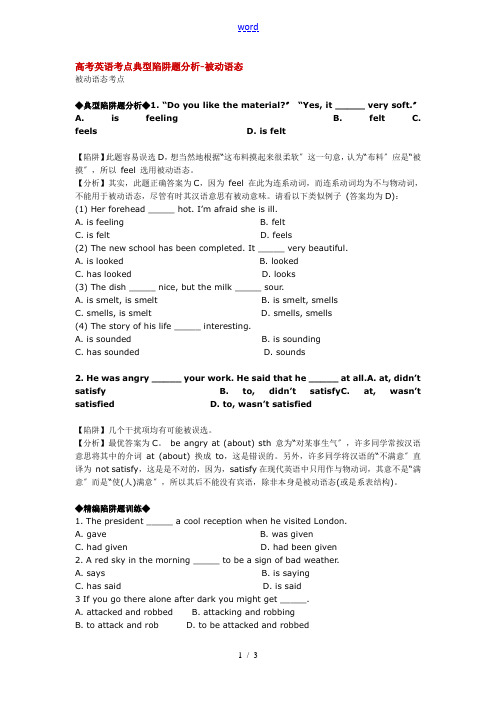
高考英语考点典型陷阱题分析-被动语态被动语态考点◆典型陷阱题分析◆1. “Do you like the material?〞“Yes, it _____ very soft.〞A. is feelingB. feltC. feelsD. is felt【陷阱】此题容易误选D,想当然地根据“这布料摸起来很柔软〞这一句意,认为“布料〞应是“被摸〞,所以feel 选用被动语态。
【分析】其实,此题正确答案为C,因为feel 在此为连系动词,而连系动词均为不与物动词,不能用于被动语态,尽管有时其汉语意思有被动意味。
请看以下类似例子(答案均为D):(1) Her forehead _____ hot. I’m afraid she is ill.A. is feelingB. feltC. is feltD. feels(2) The new school has been completed. It _____ very beautiful.A. is lookedB. lookedC. has lookedD. looks(3) The dish _____ nice, but the milk _____ sour.A. is smelt, is smeltB. is smelt, smellsC. smells, is smeltD. smells, smells(4) The story of his life _____ interesting.A. is soundedB. is soundingC. has soundedD. sounds2. He was angry _____ your work. He said that he _____ at all.A. at, didn’t satisfy B. t o, didn’t satisfyC. at, wasn’t satisfied D. to, wasn’t satisfied【陷阱】几个干扰项均有可能被误选。
高考英语陷阱题归纳总结

高考英语陷阱题归纳总结高考英语作为一门重要科目,对于考生而言是一次重要的挑战。
在备考中,我们经常会遇到一些陷阱题,这些题目可能会导致我们的失分。
因此,本文将对高考英语中的陷阱题进行归纳总结,并提供策略来应对这些陷阱。
一、同义词替换陷阱在高考英语试题中,同义词替换是一种常见的陷阱形式。
考生在阅读理解和词汇填空题中常常会遇到这类问题。
这类题目常常会使用同义词替换原文中的关键词,以考查考生对词汇的掌握能力。
因此,我们需要通过广泛的阅读和积累词汇来增加自己对同义词的敏感性,从而更好地把握题意。
二、修饰语陷阱修饰语陷阱是一种常见的语法陷阱。
在选词填空、翻译和完形填空等题目中,我们经常会遇到修饰语陷阱。
这类题目常常通过对句子中修饰语的位置和形式进行调整,试图混淆考生对句子结构的理解。
因此,我们需要注意句子结构中修饰语的位置和作用,以避免被误导。
三、语境理解陷阱语境理解是高考英语试题中的难点之一。
考生在阅读理解和完形填空等题目中常常会遇到这类问题。
这类题目常常将重点放在考生对语篇整体的理解能力上,并试图通过迷惑性的选项来干扰考生的判断。
因此,我们需要通过多读多练的方式提高对语境的理解能力,以辨别正确答案。
四、逻辑推理陷阱逻辑推理是高考英语试题中的另一个难点。
在阅读理解和写作题中常常会涉及到逻辑推理。
这类题目试图考查考生对信息提取和推理能力的掌握程度。
因此,我们需要培养自己对信息的敏感性,通过积极阅读和思考来提高自己的逻辑推理能力。
五、易混淆词汇陷阱易混淆词汇是高考英语试题中的常见陷阱。
在选词填空和阅读理解等题目中,我们经常会遇到这类问题。
这类题目通过对词汇的选择和运用来考察考生的细致观察力。
因此,我们需要通过大量的练习和积累,加强对易混淆词汇的辨析能力,以避免被误导。
综上所述,高考英语陷阱题在考试中经常出现,对考生来说是一次重要的挑战。
通过了解和归纳这些陷阱的形式,我们可以有针对性地进行备考,提高应对陷阱题的能力。
高考英语考点典型陷阱题分析-定语从句与强调句

(2) Ashdown forest, through _________ we’ll be driving, isn’t a forest any longer.
A. that B. it C. them D. which
(3) This I did at nine o’clock, after _________ I sat reading the paper.
【分析】最佳答案为C,不是A,因为在such … that … (如此……以至……)结构中,that 引导的是结果状语从句,并且 that 在从句中不充当句子成分,若在上句填入 such … that …,句末的动词 like 缺宾语。选C的理由如下:as 用作关系代词,用以引导定语从句,修饰其前的名词 boy,同时 as 在定语从句中用作动词 like 的宾语,句意为“所有老师都喜欢的一位好男孩”。有的同学可能还会问,假若选A,能否将其后的 that 视为引导定语从句的关系代词呢?不能,因为当先行词受到 such 的修饰时,其后的定语从句应用关系代词 as 来引导,而不用that。比较下面一题,答案为A,因为 like 后有自己的宾语 him:
A. their B. whose C. which D. that
【陷阱】容易误选B,认为这是非限制性定语从句。
【分析】最佳答案是 A。与上面一题相似,their parents seated together joking 不是非限制性定语从句,而是一个独立主格结构,因为空格后的动词 seated 不是谓语,而是一个过去分词,因为 seat 作动词用时,是及物动词。比较以下相似题:
高考英语 短语动词高考英语陷阱题总结归纳-短语动词(附详解)牛津版

高考英语陷阱题总结归纳——短语动词◆典型陷阱题分析◆1. When he realized the police had seen him, the man ______ the exit as quickly as possible.A. made offB. made forC. made outD. made up【陷阱】容易误选A.【分析】正确答案应选B.make for 意为“移向,走向”。
最具干扰性的选项是A,因为make off 的意思是“匆匆逃走”。
之所以不能选A,是因为 make off 不及物,其后不能接宾语;而 make for 是及物的,其后可以接宾语。
另外两个选项的意思是:make out 指“勉强了解,开出(支票等),成功”;make up 指“弥补,虚构,整理,编辑,化妆”。
2. Now and then they would ______ our house and have a talk with us.A. call onB. drop in atC. drop in onD. drop in【陷阱】几个干扰项均容易误选。
【分析】答案应选B.drop in 意为“顺便走访,不预先通知的拜访”,为不及物动词,其后不接宾语,若要接宾语,遵循以下原则:表示拜访某人,后接介词on;表示拜访某地,后接介词at.call 表示“拜访”时也遵循以上原则,即 call at 后接地点,call on 后接人。
3. “Why didn’t you write?” “My ink has _______.”A. used upB. run out ofC. given awayD. given out【陷阱】几个干扰项均容易误选。
【分析】最佳答案为D.give out 有很多意思,如表示“分发,发出(气味、热等),发表,用尽,精疲力竭”等,此题取其“用尽”之义。
选项A和B很具干扰性,它们均可表示“用完,用尽”,但是它们是及物的,其后应接宾语。
高中英语语法高考英语典型“陷阱题”解析95例
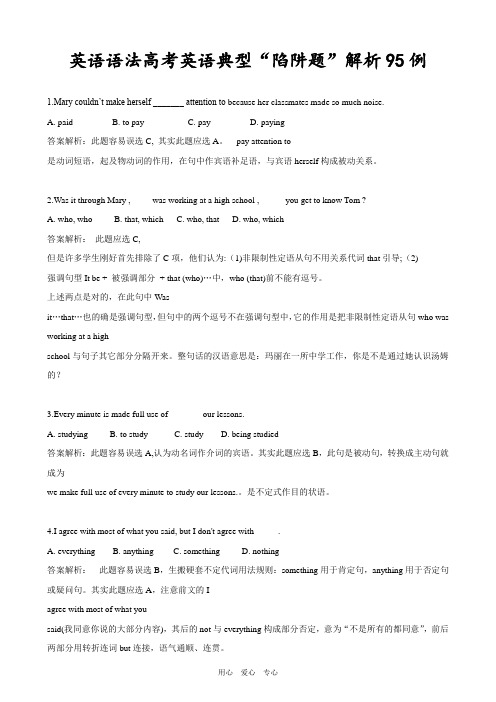
英语语法高考英语典型“陷阱题”解析95例1.Mary couldn’t make herself _______ attention to because her classmates made so much noise.A. paidB. to payC. payD. paying答案解析:此题容易误选C, 其实此题应选A 。
pay attention to是动词短语,起及物动词的作用,在句中作宾语补足语,与宾语herself 构成被动关系。
2.Was it through Mary , ____ was working at a high school , _____ you get to know Tom ?A. who, whoB. that, whichC. who, thatD. who, which答案解析: 此题应选C,但是许多学生刚好首先排除了C 项,他们认为:(1)非限制性定语从句不用关系代词that 引导;(2) 强调句型It be + 被强调部分 + that (who)…中,who (that)前不能有逗号。
上述两点是对的,在此句中Wasit …that …也的确是强调句型,但句中的两个逗号不在强调句型中,它的作用是把非限制性定语从句who was working at a highschool 与句子其它部分分隔开来。
整句话的汉语意思是:玛丽在一所中学工作,你是不是通过她认识汤姆的?3.Every minute is made full use of _______ our lessons.A. studyingB. to studyC. studyD. being studied答案解析:此题容易误选A,认为动名词作介词的宾语。
其实此题应选B ,此句是被动句,转换成主动句就成为we make full use of every minute to study our lessons.。
2023年高考英语陷阱题总结归纳虚拟语气附详解

高考英语陷阱题总结归纳——虚拟语气◆经典陷阱题分析◆1. I forget where I read the article, or I _____ it to you now.A. will showB. would showC. am going to showD. am showing【陷阱】几种干扰项均有也许误选。
【分析】对旳答案选B.根据上文旳语境可知句中旳or 隐具有一种虚拟旳条件,即or=if I didn’t forget where I read the article(要是我没忘掉我在哪儿读过这篇文章旳话——但实际上忘了)。
2. “It looks as if he were drunk.” “So it does. _____.”A. He’d better give up drinkingB. He shouldn’t have drunk so muchC. Health is more important than drinkD. I wonder why he is always doing so【陷阱】几种干扰项均有也许误选,重要是受句中drunk 一词旳影响。
【分析】最佳答案为D.关键信息是It looks as if he were drunk 中旳虚拟语气,句子既然用了虚拟语气,也就是说,“他喝醉了”不是事实,只是他旳言行仿佛是醉了,因此此题旳最佳答案是D.3. “Mary looks hot and dry” “So _____ you if you had so high a fever.”A. doB. areC. willD. would【陷阱】轻易误选A或C.选A者,认为前后两句旳动词性质应一致;选C者,认为其后带有if 条件状语从句,从语气上看,主句应用未来时态。
【分析】此题最佳答案为D.分析如下:(1)“so + 助动词+ 主语”是一种很有用旳构造,它表达“……也同样”时。
易错点10 并列句和状语从句(2大陷阱)-备战2024年高考英语考试易错题(解析版)

易错点10 并列句和状语从句目录01 易错陷阱(2大陷阱)02 举一反三【易错点提醒一】并列句易混易错点【易错点提醒二】状语从句易混易错点03 易错题通关易错陷阱1:并列句易混易错点。
【分析】1. 逻辑关系和句式结构判断法;2. 连词词义需牢记。
【高考链接】1.(2023年新高考I卷)To eat one, you have to decide whether to bite a small hole in it first, releasing the stream and risking a spill (溢出), ________ to put the whole dumpling in your mouth, letting the hot soup explode on your tongue.【答案】or【详解】考查连词。
句意:吃小笼包的时候,你必须要决定是先咬一个小口流出汤汁,还是把整个小笼包放进嘴里,让热汤在舌头上爆炸。
whether...or... “是……还是……”,固定搭配,根据句意,故填or。
【规律总结】示原因的从属连词because连用。
“或者”为表示选择关系的连词,or还可译为“否则”,可用于句型:“祈使句+or+陈述句”。
both... and..., neither... nor..., not only...but also..., either...or..., not...but...特殊搭配解题。
作并列连词。
when表示“在那时,突然”;while表示“然而,而”,表对比或转折关系。
并列连词when常用于以下句型中:...was/were doing ...when ……正在做……突然……...was/were about to do ...when ... ……刚要做……突然……...was/were on the point of doing ...when ... ……刚要做……突然……...had just done ...when ... ……刚/一……就……I had just finished my homework when Tom came to me.我刚写完作业,Tom就来找我了。
典型高考英语陷阱题详解
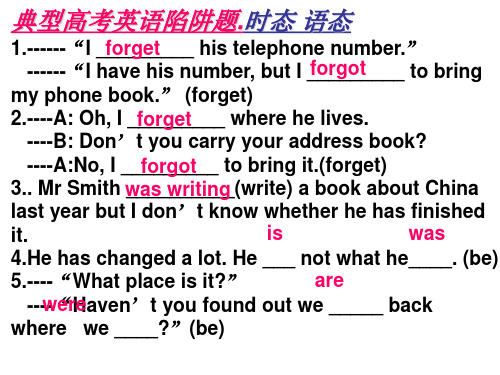
7. All her time _______ experiments, she has no time for B films. A. devoted to do B. devoted to doing C. devoting to doing D. is devoted to doing 8.All the preparations for the project ____________, completed we’re ready to start. (complete) have been completed All the preparations for the project _________________ and we’re ready to start. being 9.Such _______(be) the case, I couldn’t help support but__________(support) him. 10.Anyone __________(find) trying to take knives on heard found flights would be caught by the police.
典型高考英语陷阱题.时态 语态
forget 1.------“I _________ his telephone number.” forgot ------“I have his number, but I _________ to bring my phone book.” (forget) 2.----A: Oh, I _________ where he lives. forget ----B: Don’t you carry your address book? ----A:No, I _________ forgot to bring it.(forget) 3.. Mr Smith was __________(write) a book about China writing last year but I don’t know whether he has finished is was it. 4.He has changed a lot. He ___ not what he____. (be) are 5.----“What place is it?” were ---“Haven’t you found out we _____ back where we ____?”(be)
2023年高考英语陷阱题总结归纳冠词附详解
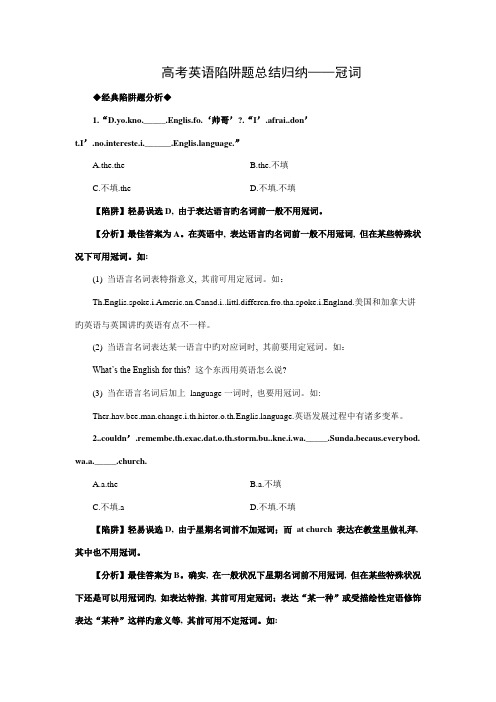
高考英语陷阱题总结归纳——冠词◆经典陷阱题分析◆1.“D.yo.kno._____.Englis.fo.‘帅哥’?.“I’.afrai..don’t.I’.no.intereste.i.______nguage.”A.the.theB.the.不填C.不填.theD.不填.不填【陷阱】轻易误选D, 由于表达语言旳名词前一般不用冠词。
【分析】最佳答案为A。
在英语中, 表达语言旳名词前一般不用冠词, 但在某些特殊状况下可用冠词。
如:(1) 当语言名词表特指意义, 其前可用定冠词。
如:Th.Englis.spoke.i.Americ.an.Canad.i..littl.differen.fro.tha.spoke.i.England.美国和加拿大讲旳英语与英国讲旳英语有点不一样。
(2) 当语言名词表达某一语言中旳对应词时, 其前要用定冠词。
如:What’s the English for this? 这个东西用英语怎么说?(3) 当在语言名词后加上language一词时, 也要用冠词。
如:nguage.英语发展过程中有诸多变革。
2..couldn’.remembe.th.exac.dat.o.th.storm.bu..kne.i.wa._____.Sunda.becaus.everybod. wa.a._____.church.A.a.theB.a.不填C.不填.aD.不填.不填【陷阱】轻易误选D, 由于星期名词前不加冠词;而at church 表达在教堂里做礼拜, 其中也不用冠词。
【分析】最佳答案为B。
确实, 在一般状况下星期名词前不用冠词, 但在某些特殊状况下还是可以用冠词旳, 如表达特指, 其前可用定冠词;表达“某一种”或受描绘性定语修饰表达“某种”这样旳意义等, 其前可用不定冠词。
如:H.cam.o.th.Sunda.an.wen.awa.o.th.Monday.他星期日来,星期一就走了。
M.birthda.happene.t.b.o..Saturday.我旳生日碰巧是星期六。
高考英语 复习代词考点典型陷阱题分析
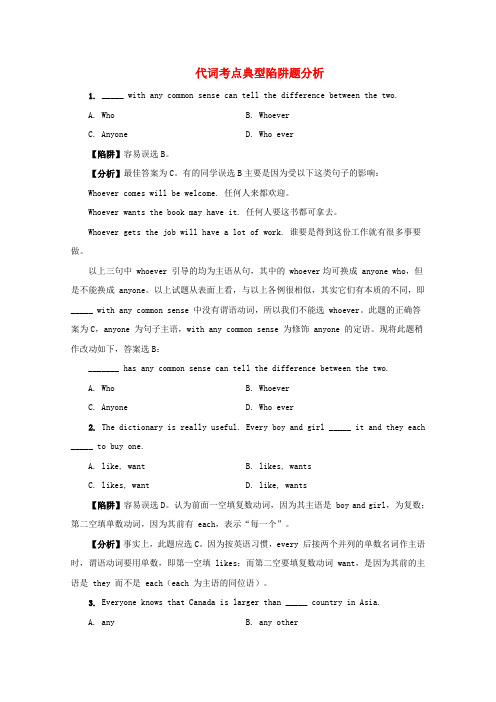
代词考点典型陷阱题分析1. _____ with any common sense can tell the difference between the two.A. WhoB. WhoeverC. AnyoneD. Who ever【陷阱】容易误选B。
【分析】最佳答案为C。
有的同学误选B主要是因为受以下这类句子的影响:Whoever comes will be welcome. 任何人来都欢迎。
Whoever wants the book may have it. 任何人要这书都可拿去。
Whoever gets the job will have a lot of work. 谁要是得到这份工作就有很多事要做。
以上三句中 whoever 引导的均为主语从句,其中的 whoever均可换成 anyone who,但是不能换成 anyone。
以上试题从表面上看,与以上各例很相似,其实它们有本质的不同,即_____ with any common sense 中没有谓语动词,所以我们不能选 whoever。
此题的正确答案为C,anyone 为句子主语,with any common sense 为修饰 anyone 的定语。
现将此题稍作改动如下,答案选B:_______ has any common sense can tell the difference between the two.A. WhoB. WhoeverC. AnyoneD. Who ever2. The dictionary is really useful. Every boy and girl _____ it and they each _____ to buy one.A. like, wantB. likes, wantsC. likes, wantD. like, wants【陷阱】容易误选D。
认为前面一空填复数动词,因为其主语是 boy and girl,为复数;第二空填单数动词,因为其前有 each,表示“每一个”。
高考英语典型陷阱题50例(含答案解析)

高考英语典型“陷阱题”50例(含答案解析)1. Mr. Wang made up his mind to devote all he could ______ his oral English before going abroad.A. improveB. to improveC. improvingD. to improving2. Everything he ______ away from him before he returned to his hometown.A. tookB. had been takenC. had had been takenD. had taken3. Before he went abroad, he spent as much time as he _____ English.A. could learningB. learnedC. to learnD. could learn4. You can never imagine what great difficulty I have ______ your house.A. foundB. findingC. to findD. for finding5. The person we spoke to ______ no answer at first.A. makingB. makesC. makeD. made6. The person we referred to ______ us a report tomorrow.A. givingB. will giveC. gaveD. give7. The days we have been looking forward to _______ soon.A. comingB. will comeC. cameD. have come8. The person we talked about ______ our school last week.A. visitingB. will visitC. visitedD. has visited9. The man whose songs we are fond of ______ in our city next week.A. singingB. to singC. will singD. sang10. Not only ______ the jewelry she _____ been sold for her son’s gambling debts but also her house.A. is; hasB. has; hadC. has; hasD. 不填; has11. ______ in thought, he almost ran into the car in front of him.A. LosingB. Having lostC. LostD. To lose12. The research is so designed that once nothing can be’ done to change it.A. beginsB. having begunC. beginningD. begun13. — What do you think made the woman so upset?— _______ weight.A. As she put onB. Put onC. Putting onD. Because of putting on14. Time should be made good use of ______ our lessons well.A. learningB. learnedC. to learnD. having learned15. It was only with the help of the local guide ______.A. was the mountain climber rescuedB. then the mountain climber was rescuedC. when the mountain climber was rescuedD. that the mountain climber was rescued16. Never ______ time come again.A. has lostB. will loseC. will lostD. lose17. — ______ was it ______ they discovered the entrance to the underground palace?— Totally by chance.A. What; thatB. How; thatC. When; howD. Where; that18. I have nothing to confess. ______ you want me to say?A. What is it thatB. What it is whatC. How is it thatD. How it is that19. Is this factory ______ you visited the other day?A. the oneB. thatC. whereD. when20. Was it _____ she heard with her ears really made her frightened?A: what; that B. it; thatC. that; whichD. what;不填21. ______ what the six blind men said sounded!A. How foolishlyB. How foolishC. What foolishlyD. What foolish22. It was ______ the old clock that the old man spent the whole morning at home.A. repairB. repairingC. to repairD. in repair23. Is this hotel ______ you said we were to stay in your letter?.A. thatB. whereC. the oneD. in which24. Please tell me the way you thought of ______ the garden.A. take care ofB. to take care ofC. takinq care ofD. how to take care of25. A fast-food restaurant is the place _______, just as the name suggests,eating is performed quickly.A. whichB. whereC. thereD. what26. The film brought the hours back to me ______ I was taken good care of in that far-away village.A. untilB. thatC. whenD. where27. The professor has written another book,________ of great importance to computer science.A. which I think it isB. and I think isC. which I think isD. when I think is28. — Where do you think ______ he ______ the computer?— Sorry, I have no idea.A. had; boughtB. has; boughtC. did; buyD. 不填; bought29. We should do more such exercises in the future, I think, _____ those we did yesterday.A. asB. likeC. aboutD. than30. He will tell you _____ he expects will win such a match.A. whyB. whomC. whichD. who31. In New Zealand, I made lots of friends _____ a very practical knowledge of the English language.A. getB. to getC. gettingD. got32. I’m busy now. I’m sorry I can’t help _____ the flowers.A. wateringB. wateredC. watersD. to water33. Who would you rather ______ the report instead of you?A. have writeB. have to writeC. writeD. have written34. We must stop pollution ______ longer.A. livingB. from livingC. to liveD. live35. — Was it under the tree ______ you were away talking to a friend?— Sure. But when I get back there, the bike was gone.A. thatB. whereC. whichD. while36. Not far from the club there was a garden, ______ owner seated in it playing bridge with his children every afternoon.A. whoseB. itsC. whichD. that37. Wang Ling was elected ______ all he is the tallest.A. becauseB. because ofC. forD. as38. We’ll be free tomorrow, so I suggest ______ to the history museum.A. to visitB. visitingC. we should visitD. a visit39. I like swimming, while what my brother enjoys ______.A. cookingB. to cookC. is cookingD. cook40. Thank you for the trouble you have ______ to help me.A. paidB. takenC. hadD. asked41. Who is it up _______ decide whether to go or not?A. to toB. for forC. to forD. for to42. We keep in touch ______ writing often.A. withB. ofC. onD. by43. — How long have you been here?— ______ the end of last month,A. InB. ByC.AtD. Since44. You should treat him (in) the way ______ suits him most.A. thatB. in whichC. 不填D. why45. He insisted that the sky ______ clear up the following day.A. wouldB. shouldC. 不填D. be46. He is a strict but kind-hearted father, ______ the children respect but are afraid of.A.不填B. thatC. for whomD. one whom47. Mr Smith is ______ a good teacher ______ we all respect.A. such;thatB. such; asC. so;thatD. so; as48. ______ nice, the food was all eaten up soon.A. TastingB. TasteC. TastedD. To taste49. — You haven’t been to Beijing, have you?—______. And how I wish to go there again!A. Yes, I haveB. Yes, I haven’tC. No, I haveD. No, I haven’t50. He was sentenced to death ______ what he has stolen from the bank.A. thatB. sinceC. becauseD. because of答案解析1.此题中包含固定短语devote…to,其中to为介词,后面应接动名词。
2023年高考英语陷阱题总结归纳动词时态附详解

高考英语陷阱题总结归纳——动词时态◆经典陷阱题分析◆.1.“.____.hi.telephon.number..“.hav.hi.number.bu..___.t.brin.m.phon.book.”.A.forget.forget .B.forgot.forgot.C.forget.forgot .D.forgot.forget【陷阱】轻易误选A, 认为“忘掉”是目前旳事。
【分析】仔细体会一下对话旳语境:第一种人说“我忘掉他旳电话号码了”, 这个“忘掉”应当是目前旳状况, 即目前忘掉了, 要否则就没有必要同对方说此话了, 故第一空应填forget;第二个人说“我有他旳号码, 但我忘掉带电话本了”, 这个“忘掉”应当是过去旳状况, 即过去忘掉带电话本, 因此目前电话本不在身上(注意句中旳转折连词but), 故第二空应填forgot, 即答案选应C.请再看一例:— Oh, I ______ where he lives.—Don’t you carry your address book?No, I ______ to bring it..A.forget.forget .B.forgot.forgot.C.forget.forgot .D.forgot.forget答案选C, 理由同上。
.2..ha.hope.t.se.he.of.a.th.station.bu..____.to.busy..A.was .B.ha.been.C.woul.be .D.woul.hav.been【陷阱】轻易误选B或D, 认为前句用了had hoped, 因此此句谓语要用B或D与之呼应。
【分析】但对旳答案为A, 前一句谓语用had hoped, 表达旳是过去未曾实现旳想法或打算, 可以译为“本想”, 而后一句说“我太忙”, 这是陈说过去旳一种事实, 因此要用一般过去时。
请做如下类似试题(答案均为A):(1)We had hoped to catch the 10: 20 train, but _____ it was gone..C.woul.find .D.woul.hav.found(2)We had hoped that you would be able to visit us, but you _____..A.didn’t .B.hadn’t.C.needn’t .D.woul.no.have(3)We had wanted to come to see him, but we ____ no time..A.had .B.ha.had.C.woul.have .D.woul.hav.had.(s.night.bu.someon._____.an..couldn’.ge.away..A.called.B.ha.called.C.woul.cal. D.woul.hav.called(5)The traffic accident wouldn’t have happened yesterday, but the driver _______ really careless..A.wa. B.is.C.wer. D.ha.bee.3.Dea.me.Jus.____.a.th.time..____te..A.look.have.B.looking.had.C.look.ha. D.looking.have【陷阱】此题轻易误选D, 认为第一空用目前分词表伴随, 第二空填have 旳一般目前时, 以保持与前面时态旳一致性。
2023年高考英语陷阱题总结归纳交际口语附详解

高考英语陷阱题总结归纳——交际口语◆经典陷阱题分析◆1. “Don’t you believe me?” “______, I’ll believe _______ you say.”A. No; whateverB. Yes; no matter whatC. No; no matter whatD. Yes; whatever【陷阱】轻易误选A。
认为Yes 永远译为“是”,No 永远译为“不”。
【分析】最佳答案选D。
在回答否认疑问句时,要尤其注意yes, no 旳对旳理解。
回答yes 时,可视为yes, I do 之类旳省略形式;回答no 时,可视为no, I don’t 之类旳省略形式。
针对上题而言,“Don’t you believe me?”旳意思是“你莫非不相信我?”其答句“Yes, I do” 旳实际意思便是“不,我相信你”,这与I‘ll believe whatever you say 旳意思完全吻合。
注意,第二空不适宜填no matter what,由于它只能引导让步状语从句,不能引导宾语从句。
请再看类似试题:2. “Would you mind if I _______ one of these books?” “_______.”A. took; Certainly notB. take; Yes, of courseC. can take; Yes, please doD. may take; No, I‘m using it【陷阱】几种干扰项均有也许误选。
【分析】最佳答案选A。
做对此题要注意两点:一是would you mind 后接if 从句时,从句谓语一般要用一般过去时(但Do you mind if 后旳谓语不用过去式);二是对would you mind… 旳回答实际上是对mind(介意)旳回答,即肯定回答表达“介意”,否认回答表达“不介意”。
请做如下类似试题:(1)“Do you mind if I smoke here?” “_______. Go to the smoking room, please.”A. Of course notB. Sure, why notC. No, I don’tD. Yes, I do答案选D。
典型高考英语陷阱题详解-时态
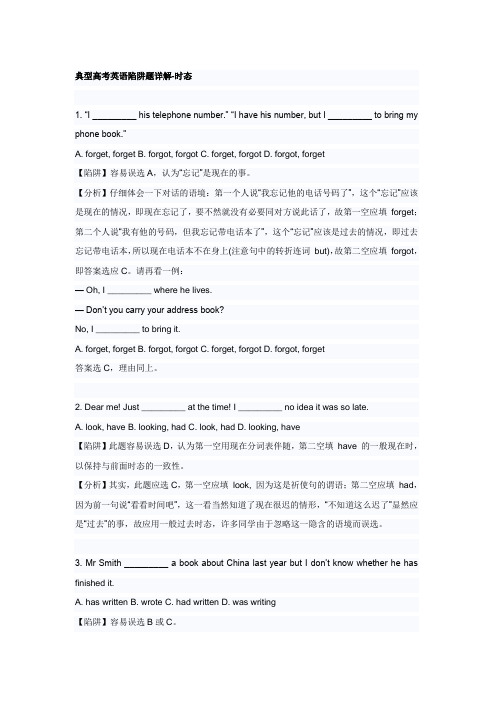
典型高考英语陷阱题详解-时态1. “I _________ his telephone number.” “I have his number, but I _________ to bring my phone book.”A. forget, forgetB. forgot, forgotC. forget, forgotD. forgot, forget【陷阱】容易误选A,认为“忘记”是现在的事。
【分析】仔细体会一下对话的语境:第一个人说“我忘记他的电话号码了”,这个“忘记”应该是现在的情况,即现在忘记了,要不然就没有必要同对方说此话了,故第一空应填forget;第二个人说“我有他的号码,但我忘记带电话本了”,这个“忘记”应该是过去的情况,即过去忘记带电话本,所以现在电话本不在身上(注意句中的转折连词but),故第二空应填forgot,即答案选应C。
请再看一例:— Oh, I _________ where he lives.—Don’t you carry your address book?No, I _________ to bring it.A. forget, forgetB. forgot, forgotC. forget, forgotD. forgot, forget答案选C,理由同上。
2. Dear me! Just _________ at the time! I _________ no idea it was so late.A. look, haveB. looking, hadC. look, hadD. looking, have【陷阱】此题容易误选D,认为第一空用现在分词表伴随,第二空填have 的一般现在时,以保持与前面时态的一致性。
【分析】其实,此题应选C,第一空应填look, 因为这是祈使句的谓语;第二空应填had,因为前一句说“看看时间吧”,这一看当然知道了现在很迟的情形,“不知道这么迟了”显然应是“过去”的事,故应用一般过去时态,许多同学由于忽略这一隐含的语境而误选。
- 1、下载文档前请自行甄别文档内容的完整性,平台不提供额外的编辑、内容补充、找答案等附加服务。
- 2、"仅部分预览"的文档,不可在线预览部分如存在完整性等问题,可反馈申请退款(可完整预览的文档不适用该条件!)。
- 3、如文档侵犯您的权益,请联系客服反馈,我们会尽快为您处理(人工客服工作时间:9:00-18:30)。
高考英语典型陷阱题详解(时态)
1.“I _________ his telephone number.” “I have his number, but I _________ to brin
g my phone book.”
A.forget, forget
B.forgot, forgot
C.forget, forgot
D.forgot, forget
【陷阱】容易误选A,认为“忘记”是现在的事。
【分析】仔细体会一下对话的语境:第一个人说“我忘记他的电话号码了”,这个“忘记”应该是现在的情况,即现在忘记了,要不然就没有必要同对方说此话了,故第一空应填for get;第二个人说“我有他的号码,但我忘记带电话本了”,这个“忘记”应该是过去的情况,即过去忘记带电话本,所以现在电话本不在身上(注意句中的转折连词but),故第二空应填f orgot,即答案选应C。
请再看一例:
—Oh, I _________ where he lives.
—Don’t you carry your address book?
No, I _________ to bring it.
A.forget, forget
B.forgot, forgot
C.forget, forgot
D.forgot, forget
答案选C,理由同上。
2.Dear me! Just _________ at the time! I _________ no idea it was so late.
A.look, have
B.looking, had
C.look, had
D.looking, have
【陷阱】此题容易误选D,认为第一空用现在分词表伴随,第二空填have 的一般现在时,以保持与前面时态的一致性。
【分析】其实,此题应选C,第一空应填look, 因为这是祈使句的谓语;第二空应填had,因为前一句说“看看时间吧”,这一看当然知道了现在很迟的情形,“不知道这么迟了”显然应是“过去”的事,故应用一般过去时态,许多同学由于忽略这一隐含的语境而误选。
3.Mr Smith _________ a book about China last year but I don’t know whether he has finished it.
A.has written
B.wrote
C.had written
D.was writing
【陷阱】容易误选B或C。
【分析】此题应选D,这是由but I don’t know whether he has finished it 这一句话的语境决定的,全句意为“史密斯先生去年在写一本书,但我不知道他现在是否写完了”。
有的同学可能由于受last year的影响而误选B。
但若选B,则句子前半部分的意思则变为“史密斯先生去年写了一本书”,既然是“写了”,那么这与下文的“但我不知道他现在是否写完了”相矛盾。
4.He has changed a lot. He _________ not what he _________.
A.is, is
B.was, was
C.is, was
D.was, is
【陷阱】几个干扰项均有可能误选。
【分析】最佳答案选C,上文说“他”变化很大,即“他”现在不是过去的那个样子了,故第一空填is,第二空填was(其实第二空也可用used to be)。
请看类例:
“What place is it?” “Haven’t you found out we _________ back wh ere we ________ _?”
A.were, had been
B.have been, are
C.are, were
D.are, had been
答案选C,We are back where we were 的意思是“我们(现在)又回到刚才来过的地方”。
5.The bridge, which _________ 1688, needs repairing.
A.is dated from
B.was dated from
C.dates from
D.dated from
【陷阱】此题容易误选B或D,认为句中用了1688 这个过去时间,所以应选过去时态,又因为date from 不用于被动语态,所以只能选D。
【分析】其实此题的最佳答案应是C,因为date from 的意思是“自某时起存在至今”(=have existed since),它通常用于一般现在时,而不用过去时态(尽管其后接的总是表示过去的时间)。
如:
The church dates from 1176. 这座教堂是六世纪建的。
The castle dates from the 14th century. 这座城堡是14世纪建的。
但若所谈论的东西现在已不复存在,则可用一般过去时。
如:
The church, which dated from the 13th century, was destroyed in an earthquake two years ago. 那座教堂是13世纪建成的,两年前在一次地震中被毁了。
注:与date from 同义的date back to 也有类似用法。
6.“You’ve left the light on.” “Oh, so I have. _________ and turn it off.”
A.I’ll go
B.I’ve gone
C.I go
D.I’m going
【陷阱】容易误选D。
【分析】A和D两者均可表示将来,填入空格处似乎都可以。
但实际上只有A是最佳的,因为根据上下文的语境来看,“我去把灯关掉”这一行为是说话人听了对方的话后临时想到的,而不是事先准备的。
而按英语习惯:will 和be going to后接动词原形均可表示意图,但意图有强弱之分,如果是事先考虑过的意图,要用be going to;如果不是事先考虑过的,而是说话时刻才临时想到的意图,则用will。
比较:
“I’ve come out without any money.” “Never mind, I will lend you some.” “我出来没带钱。
” “没关系,我借给你。
”(句中用will lend,表示“借”钱给对方是临时想到的,即听了对方的话后临时作出的反应)
I’ve bought a typewriter and I’m going to learn to type. 我买了台打字机,我想学打字。
(句中用be going to learn to type,表示说话人要学打字是事先准备的,并为此买了台打字机)。
